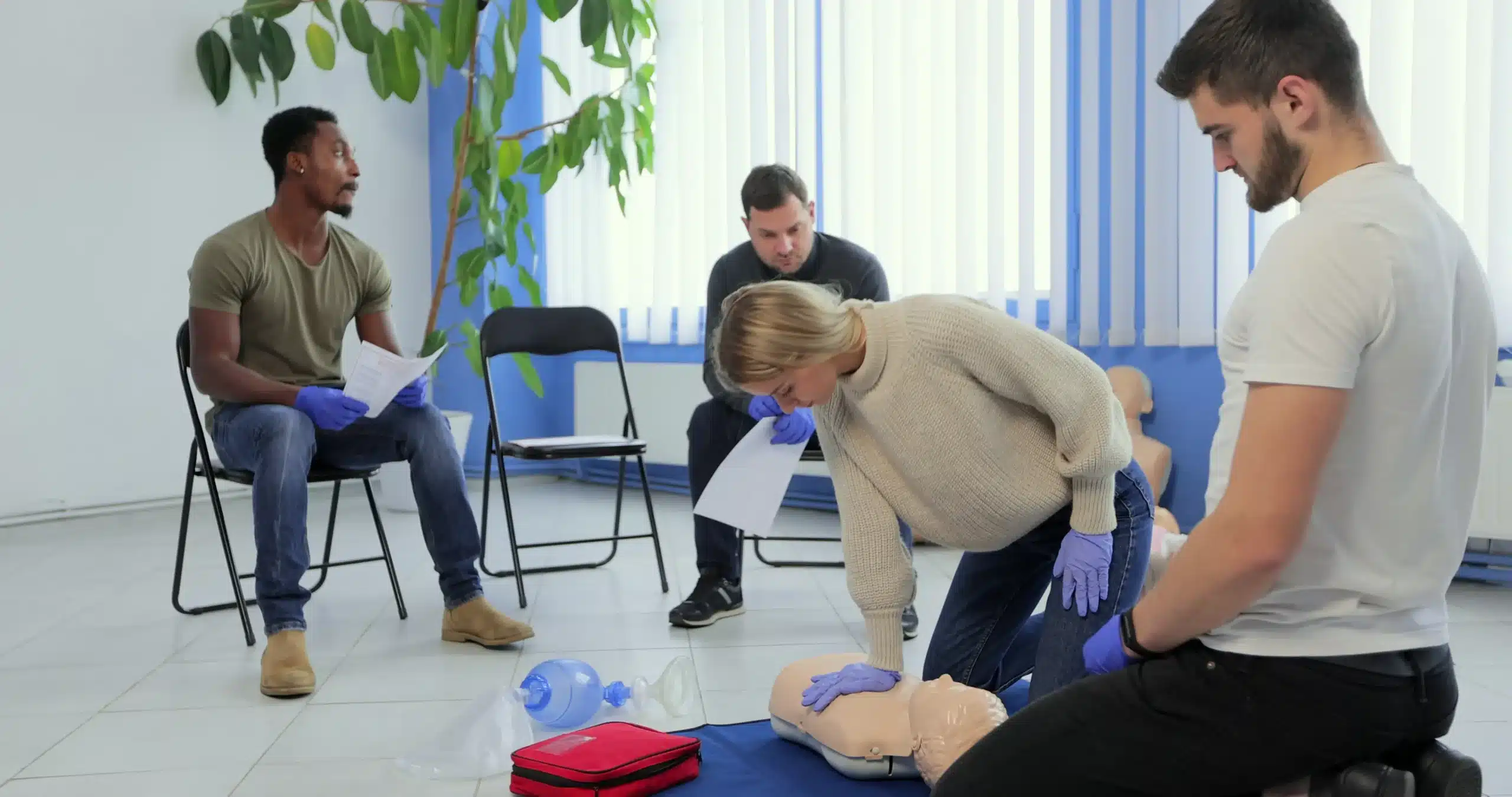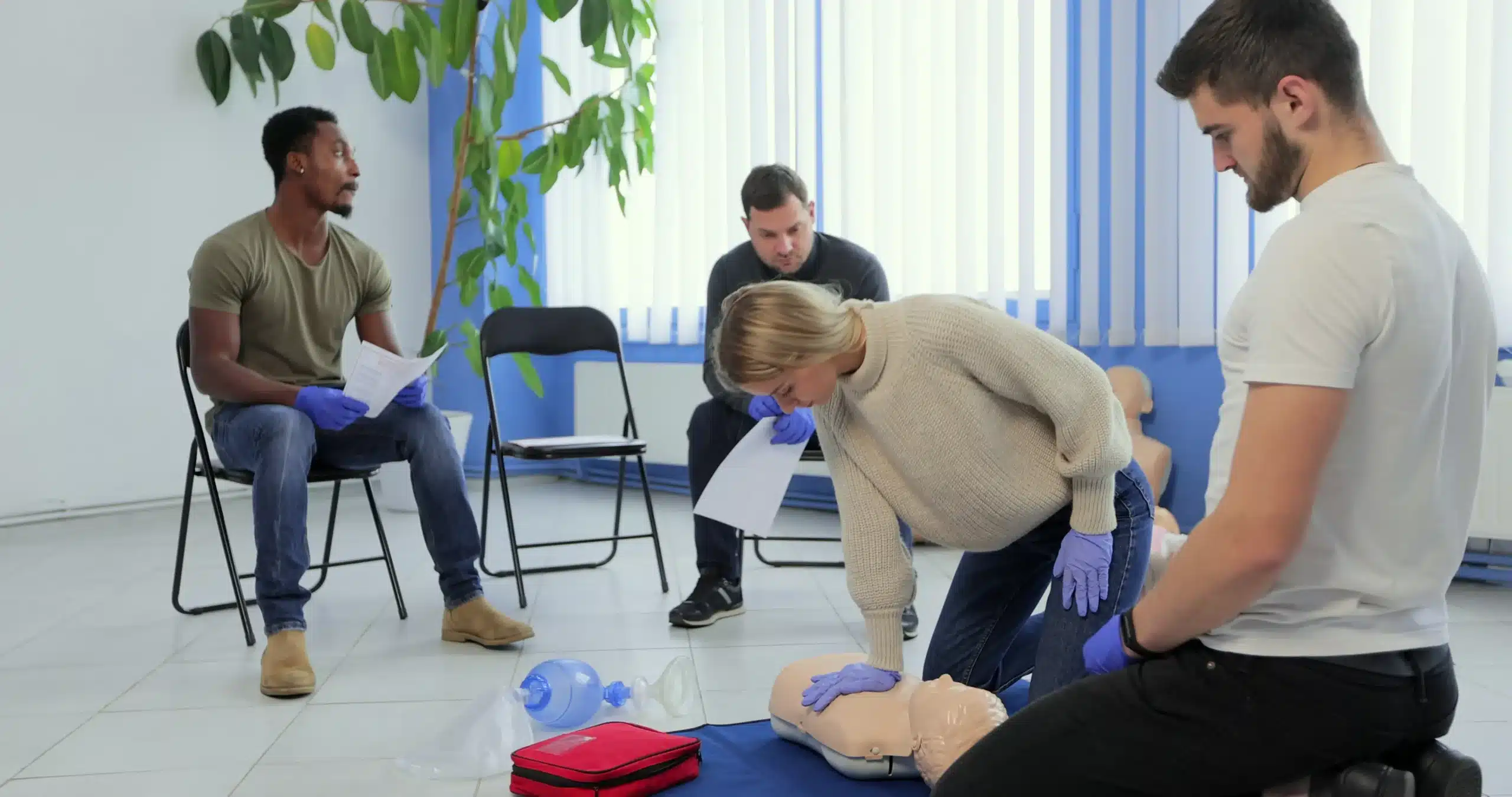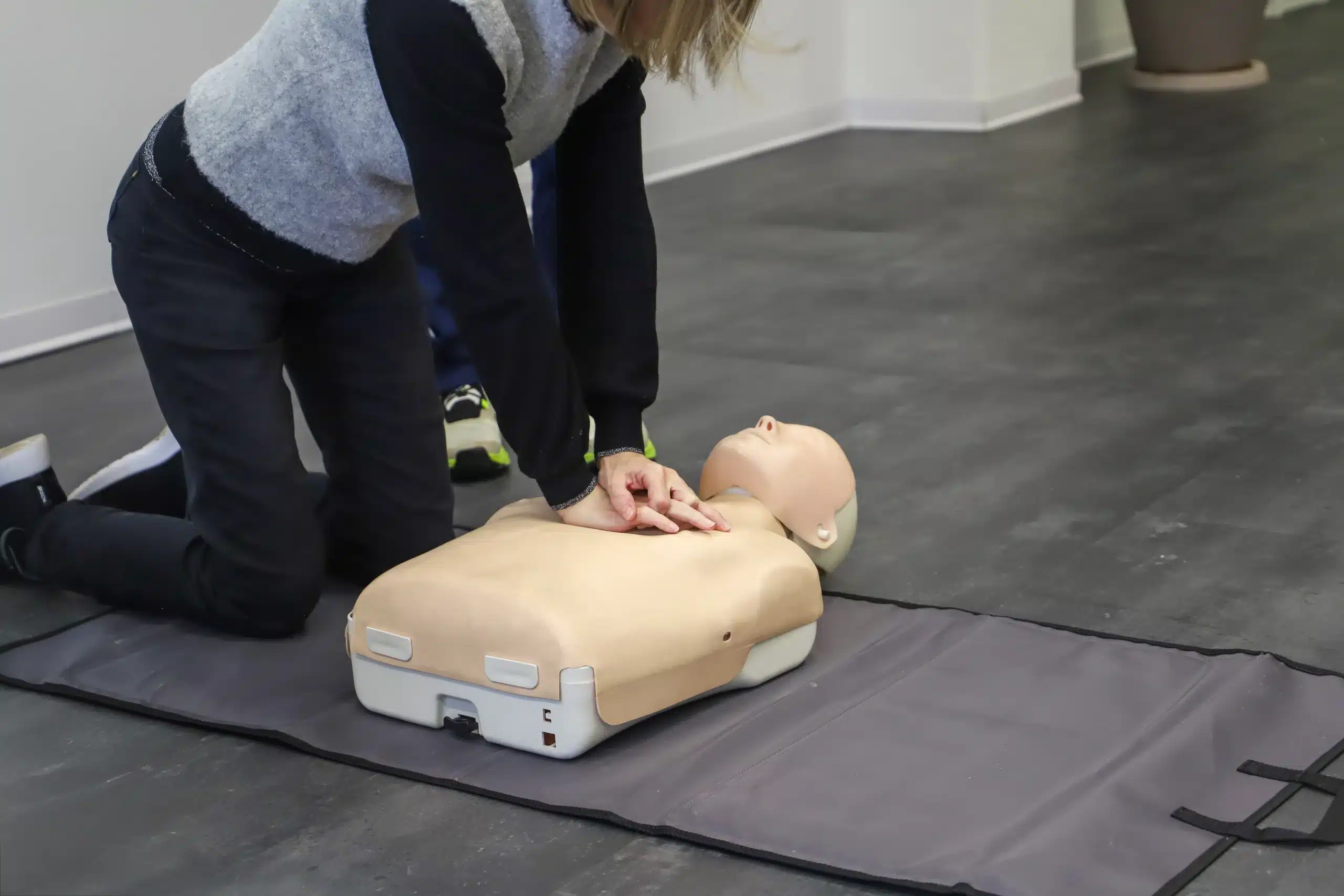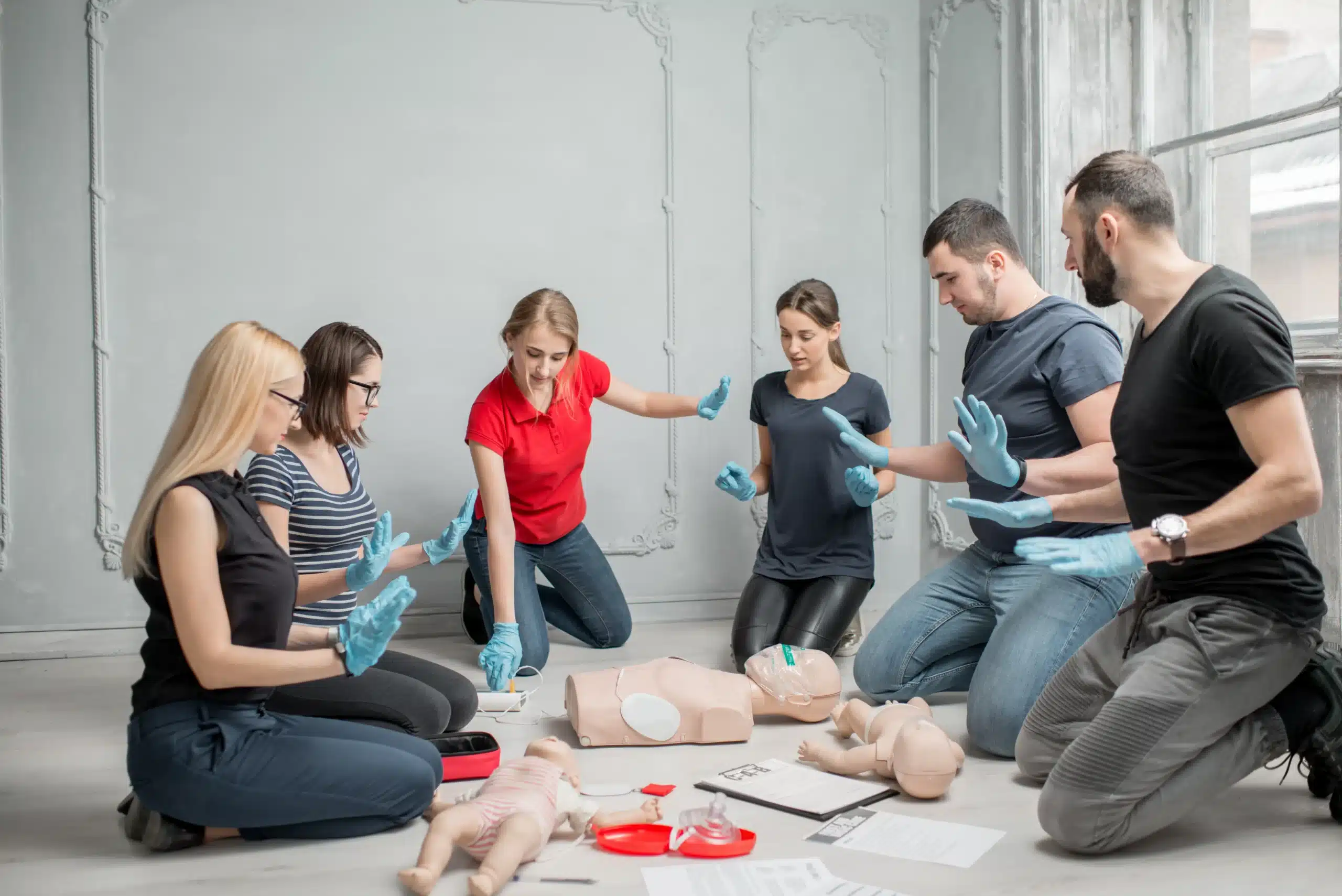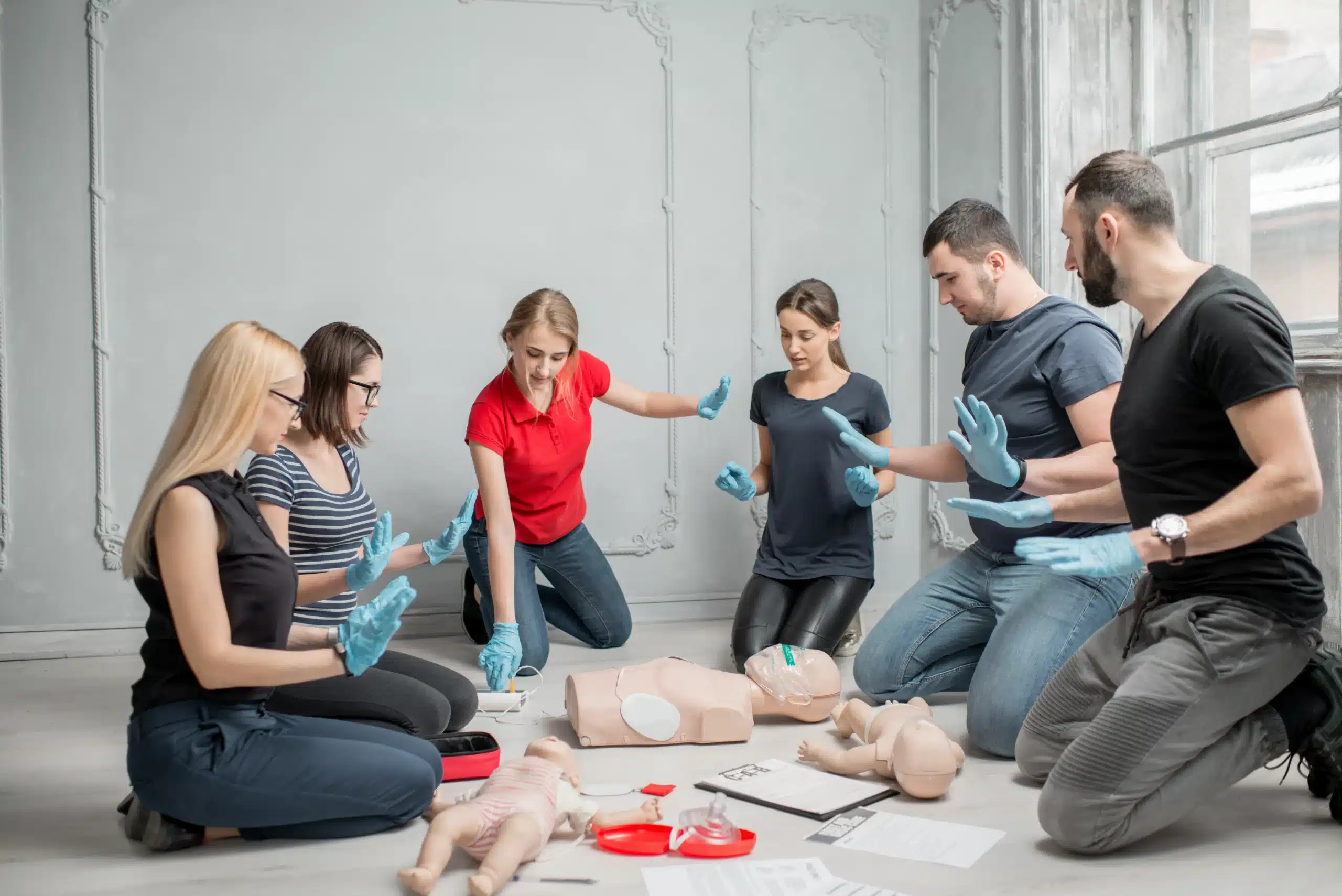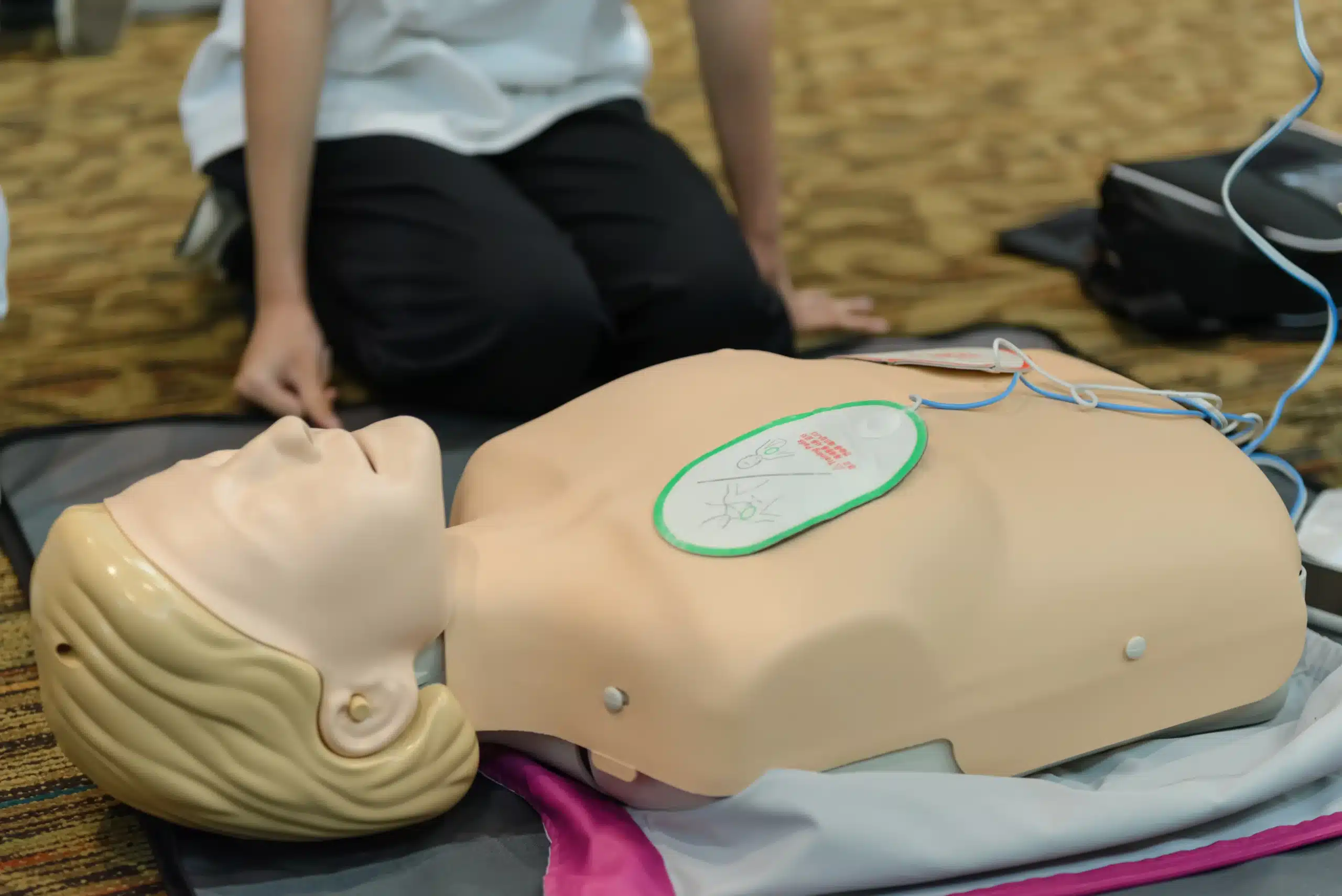Emergencies can happen anytime, anywhere. Would you know what to do if someone near you experienced a sudden cardiac arrest? CPR certification equips you with the skills and confidence to respond effectively in such critical situations. This comprehensive guide explores the world of CPR courses in Berkeley, offering insights into various training options, certification processes, and the profound impact learning CPR can have on your life and the lives of those around you.
Key Takeaways
- CPR training equips you to handle emergencies: From basic to advanced life support, CPR certification gives you the skills to respond effectively in critical situations. Find a course that matches your specific needs and professional goals.
- Accessible CPR courses are readily available: Explore various options in Berkeley, including those offered by established organizations like the American Heart Association and Safety Training Seminars. Consider factors like cost, schedule, and instructor experience.
- Hands-on learning is key to mastering CPR: Combine online resources with in-person training for a well-rounded learning experience. Practical skills and instructor feedback build confidence and ensure you can perform CPR effectively under pressure.
What is CPR? Berkeley Courses Explained
CPR, or Cardiopulmonary Resuscitation, is a lifesaving technique used when someone’s breathing or heartbeat stops. This can happen during a heart attack, near drowning, or other medical emergencies. CPR combines chest compressions and rescue breaths to keep blood and oxygen flowing to the brain and other vital organs. Learning CPR can empower you to make a real difference in a critical situation, buying precious time until professional medical help arrives.
CPR classes in Berkeley give you the skills to perform CPR correctly. Many courses are certified by the American Heart Association (AHA) and follow their latest guidelines. These courses cover everything from the basics to more advanced techniques for healthcare providers. The training is designed to be straightforward, breaking down each step so it’s easy to learn, even if you have no medical background. You’ll find options for CPR certification classes in Berkeley that fit your schedule, including both online and in-person formats. For a comprehensive list of CPR resources in Northern California, check out our directory. We also offer a low price guarantee on our CPR courses, making it easier than ever to get certified.
CPR Course Types
Knowing which CPR course is right for you can feel overwhelming, but it doesn’t have to be. This section breaks down the different types of CPR training available, so you can find the perfect fit. Whether you’re a concerned parent, a healthcare professional, or just someone who wants to be prepared, there’s a course for you. We offer a variety of CPR and first-aid classes throughout Northern California, including San Francisco, San Jose, Oakland, Sacramento, Berkeley, and Concord.
Basic CPR
Basic CPR courses equip you with the fundamental skills to respond to cardiac emergencies. These courses typically cover chest compressions, rescue breaths, and how to recognize the signs of a heart attack. Basic CPR certification is a great option for anyone looking to learn lifesaving skills, including teachers, coaches, and other community members. Check our Northern California CPR directory to find a class near you.
BLS for Healthcare Providers
BLS (Basic Life Support) for Healthcare Providers goes a step further than basic CPR. This certification covers high-quality CPR techniques, using an AED (automated external defibrillator), and other essential skills for healthcare professionals. BLS certification is often a job requirement for medical professionals like doctors, nurses, and EMTs. It ensures they can respond effectively in emergencies. We offer a low price guarantee on all our courses.
ACLS for Advanced Medical Professionals
ACLS (Advanced Cardiovascular Life Support) training is for experienced healthcare providers involved in managing cardiopulmonary arrest and other cardiovascular emergencies. This advanced training builds upon the foundation of BLS and introduces more complex interventions, such as using medications and managing airways. Contact us to learn more about our ACLS courses.
Pediatric CPR and First Aid
Designed for parents, caregivers, and childcare providers, Pediatric CPR and First Aid courses focus on the unique needs of infants and children. You’ll learn how to respond to emergencies like choking, cardiac arrest, and other common childhood injuries. This specialized training provides the confidence to act quickly and effectively when a child’s safety is at risk. Our instructors are experts in pediatric care and can answer any questions you may have. Contact us to find a class.
Hands-Only CPR
Hands-Only CPR is a simplified yet effective method that emphasizes continuous chest compressions without rescue breaths. This streamlined approach makes it easier for bystanders to provide immediate assistance during a cardiac arrest. Learning Hands-Only CPR is a valuable skill for anyone, regardless of their background, and can significantly improve the chances of survival. Consider taking one of our RQI classes for a fast and efficient certification process.
Where to Find CPR Training in Berkeley
Finding the right CPR class can feel overwhelming, but several reputable organizations offer training in Berkeley. Here’s a rundown of your options:
American Heart Association
The American Heart Association (AHA) sets the standard for CPR training. Their certifications are widely accepted and respected. You can find AHA-certified courses through various training centers throughout Berkeley, covering everything from basic CPR to advanced life support.
Safety Training Seminars
Safety Training Seminars offers a range of AHA-certified courses, including CPR, BLS, ACLS, PALS, and First Aid. Serving Northern California since 1989, they focus on providing convenient and affordable training. Check their website for a low price guarantee and to learn about their innovative RQI program.
American Red Cross
The American Red Cross is another well-known provider of CPR and AED training. They offer various learning formats, including in-person classes, online courses, and blended learning that combines online learning with in-person skills sessions. You can find Red Cross CPR classes in Berkeley.
Berkeley Fire Department
The Berkeley Fire Department often provides CPR training through community outreach. These programs aim to empower residents with essential life-saving skills. Check their website or contact the department for information on upcoming CPR training.
National CPR Foundation
The National CPR Foundation offers a range of online CPR courses. Online learning provides flexibility, but remember that hands-on practice is crucial, so supplement any online course with in-person skills practice.
CPR Certification: Costs & Benefits
Getting CPR certified is an investment in yourself and your community. Understanding both the costs and the life-saving benefits will help you choose the right course.
Course Costs
CPR course fees in Berkeley generally range from $95 to $105, depending on the provider and the type of course. A basic CPR course might be on the lower end of that range, while a more specialized course like BLS for Healthcare Providers could be closer to the higher end. Check with specific providers like Safety Training Seminars for their current pricing on their website.
Discounts and Deals
Many training centers offer discounts for groups, students, or returning customers. Some also run promotions, so it’s worth checking for deals. Safety Training Seminars offers a low-price guarantee, so you can feel confident you’re getting a competitive rate. Look for providers offering American Heart Association (AHA) certified courses, as the AHA is a highly respected authority in CPR training.
The Value of CPR Skills
While there’s a financial cost to CPR training, the value of these skills is immeasurable. Learning CPR equips you with the ability to respond effectively during medical emergencies. This knowledge can make a profound difference, potentially saving lives. Think of it as an investment in your confidence and preparedness, empowering you to act quickly when every second counts. Beyond personal satisfaction, CPR certification can also enhance your professional qualifications, especially in fields like healthcare, education, and childcare. This directory lists CPR classes in Northern California. Contact us if you have any questions.
Get Certified: Process and Renewal
Getting your CPR certification is straightforward and often faster than you think. This section walks you through what to expect, from course content to renewal requirements.
Course Length and Content
CPR courses cover essential life-saving techniques, including chest compressions, rescue breaths, and how to recognize the signs of a cardiac arrest. You’ll also learn how to use an automated external defibrillator (AED). The content will vary in depth and complexity depending on the specific course—Basic Life Support (BLS), Advanced Cardiovascular Life Support (ACLS), or Pediatric Advanced Life Support (PALS). In Berkeley, courses typically range from a few hours to a full day, with costs between $95 and $105. Check our low price guarantee for the best value.
Hands-on Practice
Effective CPR training emphasizes hands-on practice. Instructors guide you through each step, providing feedback and ensuring you develop the muscle memory and confidence to perform CPR effectively in a real emergency.
How Long is Certification Valid?
CPR certifications are typically valid for two years. Staying current with your certification ensures your skills are up-to-date and you’re prepared to respond effectively.
Renewing Your Certification
Renewing your CPR certification is a simple process. Renewal courses are often shorter than initial certification courses, focusing on refreshing your knowledge and skills. Our RQI classes offer a fast and efficient way to renew your American Heart Association certifications.
Online and Blended Learning
Many CPR training providers now offer flexible learning options, including online and blended learning formats. Online components allow you to learn the theoretical aspects of CPR at your own pace, while in-person sessions focus on essential hands-on practice and skills assessment. This blended approach offers convenience and flexibility. Contact us to learn about available options and find the best fit for your learning style.
Find the Right CPR Course
Choosing the right CPR course is crucial for effective learning and credible certification. Here’s what to consider:
Accreditation and Recognition
Look for courses certified by reputable organizations like the American Heart Association (AHA). AHA certification is widely recognized, ensuring your training meets national standards. Safety Training Seminars offers a variety of AHA-certified courses, giving you confidence in the quality of your education.
Instructor Expertise
Experienced instructors are key to a positive learning experience. Instructors should be certified and possess strong communication skills, making complex medical concepts easy to understand. Ask about an instructor’s background before enrolling in a CPR class.
Course Resources
Consider the resources offered. High-quality CPR training often includes manuals, online materials, and practice equipment. Understanding associated costs is also essential. Check our low-price guarantee to ensure you’re getting the best value.
Scheduling Options
Convenient scheduling is a must. Look for courses offered on various days and times, including evenings and weekends. Safety Training Seminars offers flexible scheduling to fit your lifestyle. We strive to make our courses accessible.
Tech-Enhanced Training
Modern CPR training often incorporates technology. The AHA’s RQI program uses simulation stations to provide real-time feedback, improving performance and skill retention. This can make your training more engaging and effective.
Master CPR: Skills and Myths
Essential CPR Techniques
CPR combines chest compressions and rescue breaths to maintain blood circulation and oxygen flow during cardiac arrest. High-quality CPR emphasizes proper hand placement, compression depth, and rate. Training programs offered by organizations like the American Red Cross and Berkeley CPR Classes cover these techniques and the use of an AED. These courses provide hands-on practice and instructor feedback, crucial for developing the muscle memory and confidence needed to perform CPR effectively. Learning proper AED use is also a vital part of CPR training, as rapid defibrillation can significantly improve survival rates.
CPR Myths Debunked
One common misconception is that online-only CPR certifications are sufficient. While convenient, they often lack the hands-on component crucial for mastering CPR skills and may not meet workplace requirements. Another myth suggests that you must be certified to perform CPR. While certification isn’t legally mandatory, it equips you with the skills and confidence to act decisively in a crisis. It’s always best to receive proper training from a qualified instructor.
Real-World CPR Scenarios
Understanding how CPR applies in real-world situations is essential. Knowing CPR can dramatically increase the chances of survival following a cardiac arrest, a situation that affects thousands annually. Studies show that CPR knowledge can double or even triple a person’s survival rate. CPR training programs often present various scenarios, from assisting a stranger in a public place to helping a family member at home. This practical approach prepares you to respond effectively in diverse emergencies. Whether you’re a healthcare professional, a teacher, a parent, or simply someone who wants to be prepared, CPR training empowers you to make a difference. Consider contacting Safety Training Seminars to find a course that fits your needs.
Related Articles
- CPR Certification in San Francisco: A Complete Guide
- CPR Training in Northern California: A Complete Guide
- ACLS Certification in Berkeley: Your Complete Guide
- Basic Life Support (BLS) in Berkeley: Top Courses
Frequently Asked Questions
What’s the difference between BLS and CPR?
CPR is the core skill within BLS. Think of BLS as a broader approach to life support, encompassing CPR but also adding other crucial elements like using an AED and managing airways. If you’re a healthcare provider, BLS certification is usually required, while standard CPR training is suitable for anyone wanting to learn lifesaving skills.
How do I choose the right CPR class in Berkeley?
Finding the right class depends on your needs and goals. Consider whether you need basic CPR training or a more advanced certification like BLS or ACLS. Look for classes offered by reputable organizations like the American Heart Association or the American Red Cross. Also, think about factors like cost, schedule, and instructor experience. Don’t hesitate to contact different providers and ask questions before enrolling.
What if I’m nervous about performing CPR in a real emergency?
It’s completely normal to feel apprehensive. That’s why good CPR training includes plenty of hands-on practice and guidance from experienced instructors. This helps build your confidence and muscle memory so you can react effectively under pressure. Remember, any attempt at CPR is better than none.
Is online CPR certification enough?
While online courses offer a convenient way to learn the basics, they typically don’t include the hands-on practice crucial for mastering CPR. Many employers and certifying organizations require in-person skills assessment and practice. A blended learning approach, combining online learning with in-person skills sessions, is often the best option.
How often do I need to renew my CPR certification?
Most CPR certifications are valid for two years. Renewing your certification ensures your skills and knowledge are up-to-date with the latest guidelines. Renewal courses are often shorter than initial certification courses and focus on refreshing your skills.



